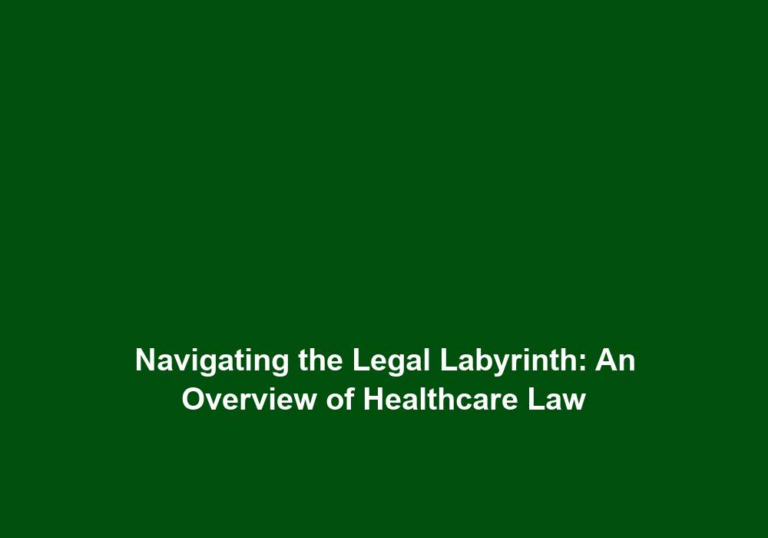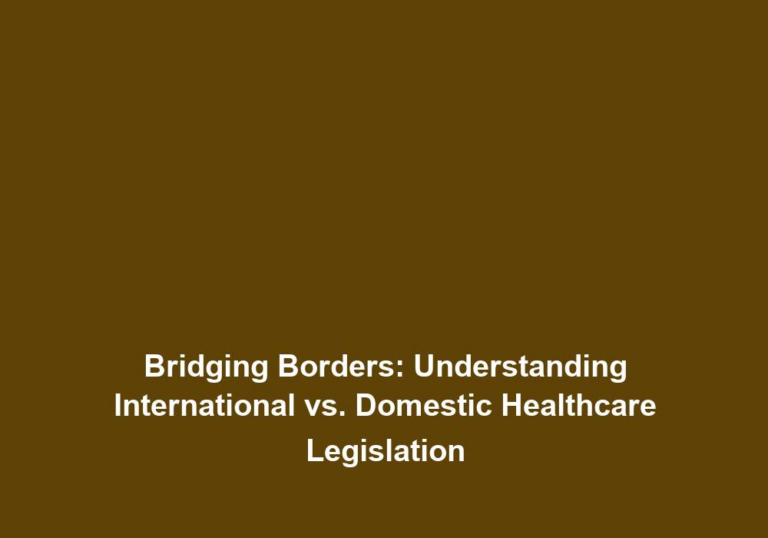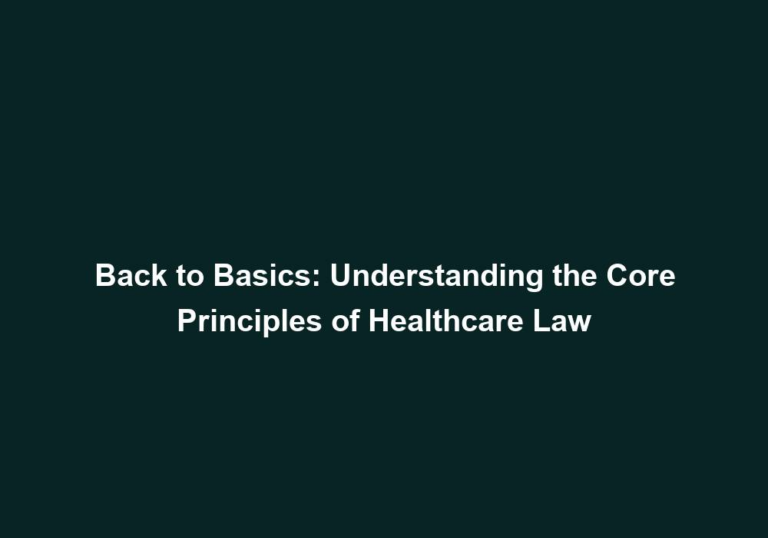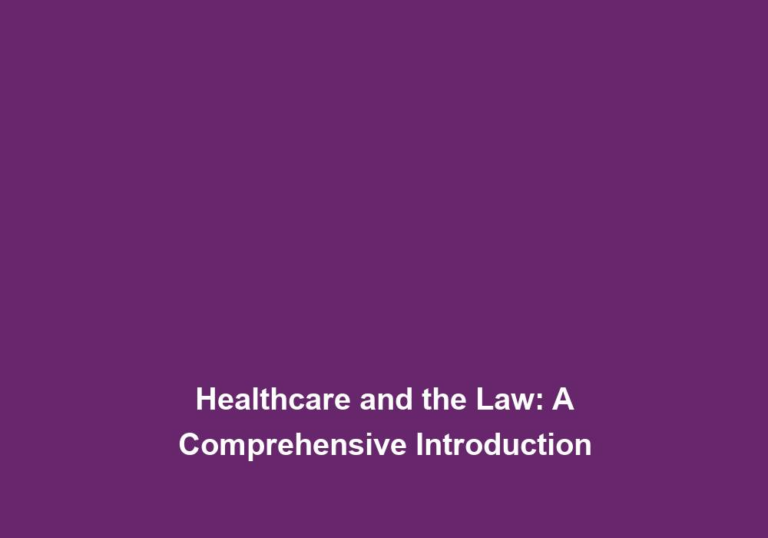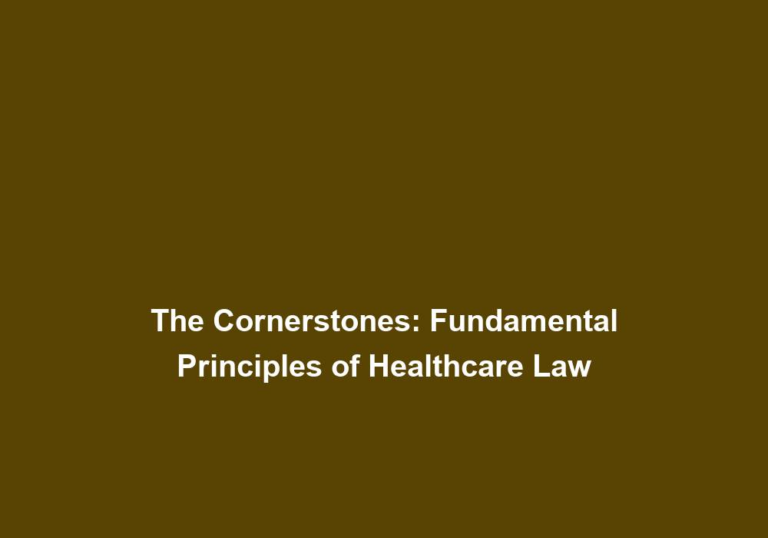Principles at the Heart: Fundamental Aspects of Healthcare Law
Healthcare law is a complex and ever-evolving field that encompasses a wide range of legal principles and regulations designed to govern and protect the healthcare industry. It involves not only the legal aspects of healthcare delivery and patient rights but also the intricate relationship between healthcare providers, payers, and regulatory bodies. In this article, we will delve into the fundamental aspects of healthcare law, exploring key principles that are at the heart of this vital legal field.
1. The Legal Framework of Healthcare Law
The legal framework of healthcare law establishes the foundation upon which all healthcare-related regulations are built. It encompasses federal, state, and local laws, statutes, regulations, and court decisions. This multi-tiered approach ensures that healthcare laws are comprehensive and adaptable to the evolving needs of the industry.
Constitutional Law: The U.S. Constitution provides the basis for healthcare law and sets the limits of governmental power in regulating healthcare. It establishes the rights and liberties of individuals and defines the powers of the federal and state governments in healthcare matters. Constitutional law ensures that healthcare regulations adhere to the principles of due process, equal protection, and individual rights.
Statutory Law: Statutes enacted by legislative bodies at the federal and state levels serve as the primary source of healthcare law. Examples include the Affordable Care Act (ACA) at the federal level and state-specific healthcare regulations. Statutory law addresses various aspects of healthcare, such as insurance coverage, patient rights, and public health initiatives.
Administrative Law: Administrative agencies, such as the Centers for Medicare and Medicaid Services (CMS) and the Food and Drug Administration (FDA), play a crucial role in healthcare law. They are responsible for implementing and enforcing regulations, issuing guidelines, and overseeing compliance within the industry. Administrative law ensures that healthcare providers and organizations meet specific standards and regulations to protect patient safety and quality of care.
Case Law: Court decisions, particularly those handed down by federal and state courts, shape healthcare law through legal interpretations, establishing precedents that guide future legal actions and rulings. Case law provides clarity on ambiguous statutory language and helps define the boundaries of healthcare regulations. It ensures consistency and fairness in legal interpretations within the healthcare field.
2. Patient Rights and Informed Consent
At the core of healthcare law is the protection of patient rights and ensuring informed consent. Patients have the right to make decisions about their medical treatment, access their medical records, and receive confidential and respectful care. These principles aim to empower patients and safeguard their well-being.
Informed Consent: Informed consent is a fundamental aspect of healthcare law. Healthcare providers must obtain the informed consent of patients before performing any medical procedures or treatments. This includes providing detailed information about the risks, benefits, and alternatives to the proposed intervention, allowing patients to make informed decisions about their care. Informed consent ensures that patients have the autonomy to participate in their healthcare decisions and promotes shared decision-making between patients and healthcare professionals.
Confidentiality and Privacy: Healthcare providers are legally obligated to safeguard patient information and maintain strict confidentiality. This includes adhering to the Health Insurance Portability and Accountability Act (HIPAA), which protects the privacy and security of patients’ health records. Confidentiality and privacy laws ensure that patient information is not disclosed without proper authorization, protecting patients from unauthorized access and potential harm.
Non-Discrimination: Patients have the right to receive equal and non-discriminatory treatment regardless of their race, color, national origin, religion, sex, age, or disability. Laws such as the Americans with Disabilities Act (ADA) and the Civil Rights Act of 1964 ensure protection against discrimination in healthcare settings. Non-discrimination principles promote fairness and equity in healthcare delivery, ensuring that all individuals have access to quality care irrespective of their personal characteristics.
3. Medical Malpractice and Liability
Healthcare providers, including physicians, nurses, hospitals, and other healthcare facilities, bear the responsibility of providing safe and competent care to their patients. When medical negligence occurs, medical malpractice laws come into play. These laws aim to hold healthcare providers accountable for their actions and provide compensation to patients who have suffered harm as a result.
Standard of Care: Healthcare providers must adhere to an established standard of care, which is the level of care that a reasonably competent provider with similar training and experience would provide in the same circumstances. Deviations from this standard may lead to liability if harm to the patient occurs. The standard of care ensures that healthcare providers meet a minimum level of competence and professionalism, promoting patient safety and quality of care.
Negligence and Causation: To establish a medical malpractice claim, the patient must prove that the healthcare provider was negligent in their duty of care and that this negligence directly caused harm or injury. This typically requires expert testimony and evidence to demonstrate that the provider’s actions or omissions deviated from the standard of care and resulted in harm. Negligence and causation principles ensure that patients receive compensation for damages caused by healthcare provider negligence.
Statute of Limitations: Each state defines a specific time limit within which a medical malpractice claim must be filed. This statute of limitations varies by jurisdiction and can significantly impact the patient’s ability to seek legal recourse. Patients must be aware of these time limits to ensure timely filing of their claims. Statutes of limitations serve to balance the need for justice with the need for legal finality and prevent undue delay in seeking legal remedies.
4. Healthcare Fraud and Abuse
Preventing fraud and abuse within the healthcare system is another crucial aspect of healthcare law. Healthcare fraud involves intentionally misrepresenting information or engaging in deceptive practices to obtain unauthorized benefits or payments. The detection and prevention of healthcare fraud and abuse protect the integrity of the healthcare system and ensure that resources are appropriately utilized.
False Claims Act: The False Claims Act (FCA) imposes liability on individuals or entities that submit fraudulent claims to government healthcare programs, such as Medicare or Medicaid. Violations of the FCA can result in significant penalties and legal consequences. The FCA acts as a deterrent against fraudulent billing practices, false certifications, and other deceptive activities that exploit the healthcare system for personal gain.
Anti-Kickback Statute: The Anti-Kickback Statute prohibits the exchange of remuneration in return for referrals of patients or the purchase of healthcare services paid by federal healthcare programs. It aims to prevent illegal financial arrangements that can compromise patient care and increase costs. The Anti-Kickback Statute ensures that healthcare decisions are based on the patient’s best interests rather than financial incentives.
Stark Law: The Stark Law prohibits physicians from referring patients to entities with which they have a financial relationship, unless an exception applies. This law addresses potential conflicts of interest and aims to ensure that medical decisions are based on the best interests of the patient. The Stark Law prevents self-referral practices that may lead to unnecessary procedures or services driven by financial motives rather than medical necessity.
5. Regulatory Compliance and Quality Assurance
Compliance with healthcare regulations is essential for healthcare providers and organizations to ensure the delivery of safe, effective, and high-quality care. Regulatory compliance involves adhering to various guidelines, standards, and reporting requirements. Quality assurance initiatives complement regulatory compliance efforts by focusing on continuous improvement and patient-centered care.
HIPAA Compliance: Healthcare providers must comply with HIPAA regulations to protect patient privacy and security. This includes establishing safeguards, conducting risk assessments, and implementing policies and procedures to prevent data breaches. HIPAA compliance ensures that patient information is handled with the utmost confidentiality and security, safeguarding patients’ rights and trust in the healthcare system.
Accreditation and Certification: Healthcare facilities often seek accreditation from organizations such as The Joint Commission or the Accreditation Association for Ambulatory Health Care to demonstrate their commitment to quality and patient safety. Accreditation signifies adherence to rigorous standards and guidelines that encompass various aspects of healthcare delivery. Certification programs, such as those for Electronic Health Record (EHR) systems, also ensure compliance with specific standards, promoting interoperability and data exchange.
Quality Improvement Initiatives: Healthcare providers engage in ongoing quality improvement efforts to enhance patient care outcomes and safety. This may involve the implementation of evidence-based practices, performance measurement, and the identification of areas for improvement. Quality improvement initiatives drive innovation, foster a culture of continuous learning, and facilitate the delivery of patient-centered care.
In conclusion, the field of healthcare law encompasses a vast array of legal principles and regulations that govern the healthcare industry. Understanding the fundamental aspects of healthcare law, including patient rights, medical malpractice, fraud and abuse, and regulatory compliance, is vital for healthcare providers, patients, and all stakeholders involved. By upholding these principles, the healthcare system can ensure the provision of safe, ethical, and high-quality care to individuals and communities.


